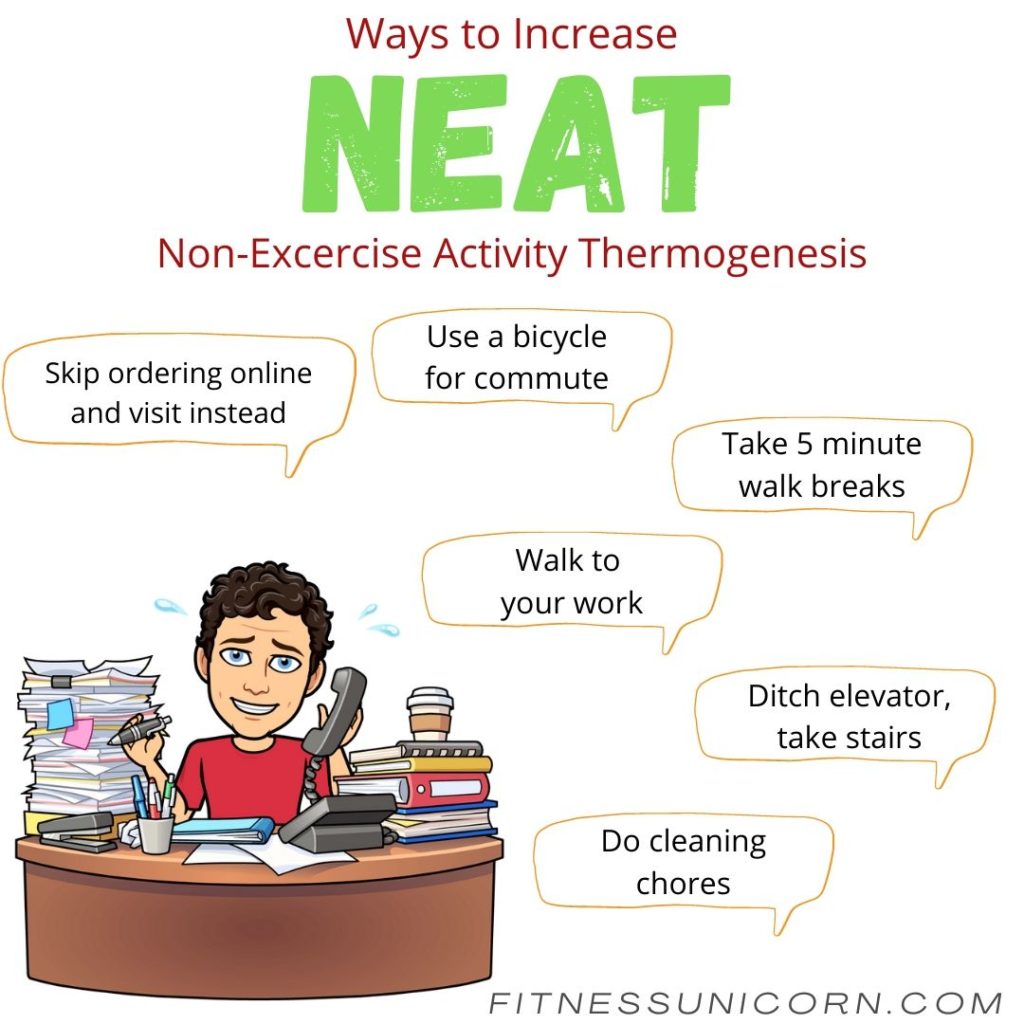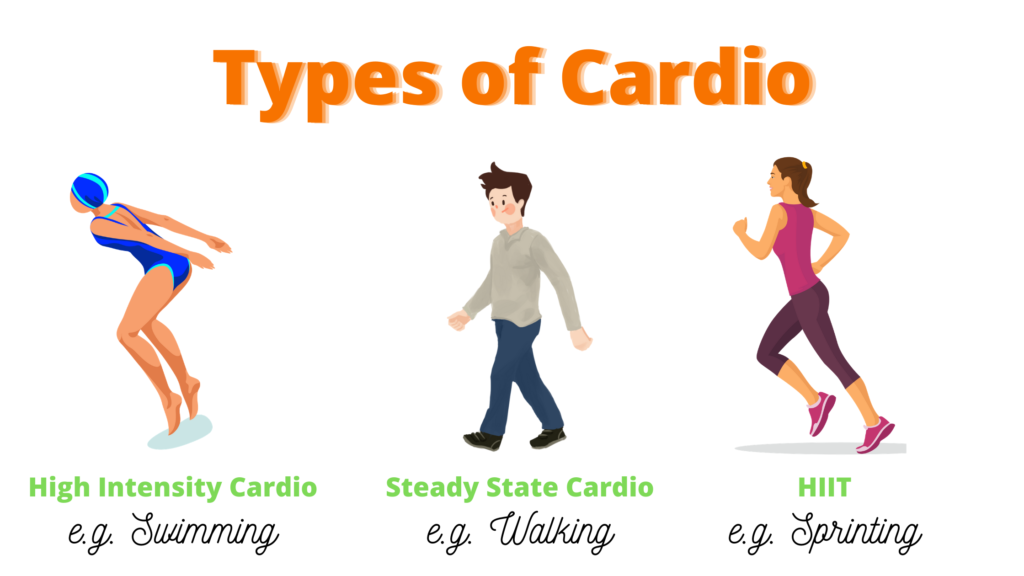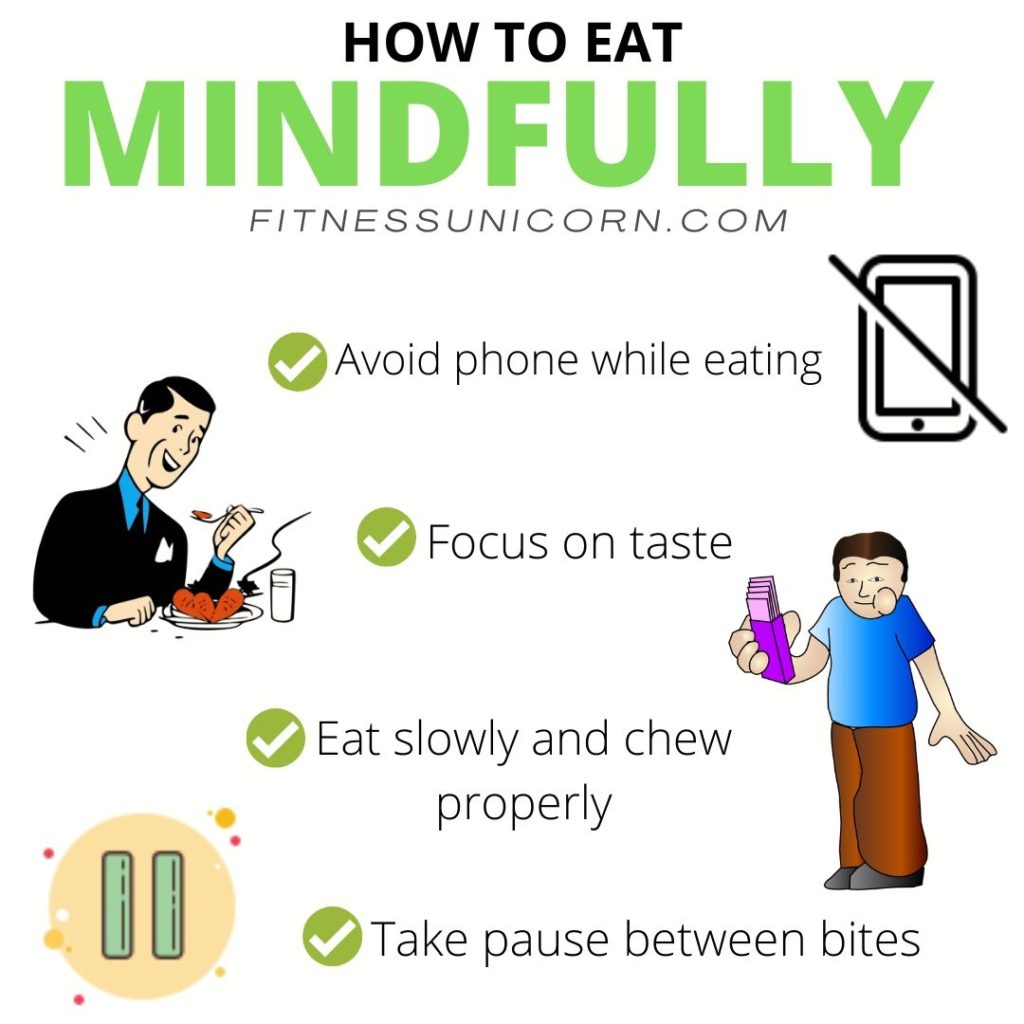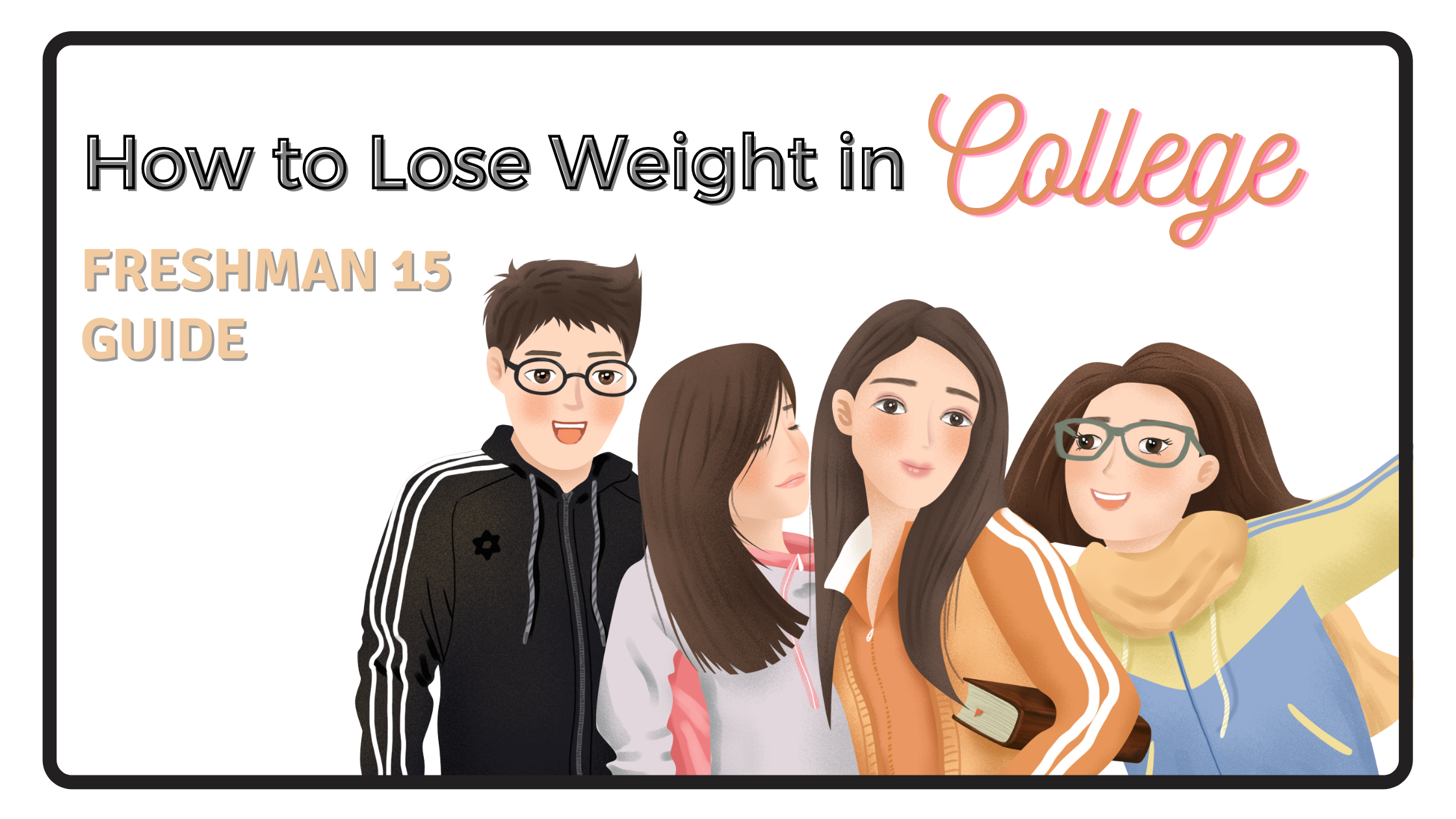In the first few years of my college life, I was quite unhappy with the way I looked. I would look at my “thin” friends with utter bewilderment. They ate the same food as me, but never seemed to put on weight.
Extra pounds on my belly made me wonder how to lose weight in college. Thankfully I was able to achieve my ideal body shape within a few months.

College life is filled with new experiences, changes, and some questions that remain unanswered. It is also an onset of some life-long friendships, parties, and a typically laid-back lifestyle.
I have written this guide on how to lose weight in college for those who want to shed some extra pounds and gain more CONFIDENCE in their lives.
The initial weight gain in your first few years of college is also referred to as Freshman 15.
What is Freshman 15
Freshman 15 is a belief that college students gain 15 lbs during the freshman year.
According to a study, only 3% actually gain more than 15 lbs of weight. However, the majority of participants experienced a noticeable hike in the scale. An average college freshman puts on around 4 lbs of weight.
Whether you are in that 3% or you belong to the 97%, or even if you are just entering your college, this guide will tell you how to avoid the freshman 15 and how to lose weight in college.
We tend to experience major weight changes during the first semester of college due to a significant change in the environment and lifestyle. Think about those late-night munchies, sudden party plans, and weekend jams.
Working out becomes a thing of the past as you enter college. Among all those classes, assignments, exams, and parties, there is hardly any time left to get your dose of exercise.
It is essential that you don’t let this phase become a starting point for life-long weight gain. My guide will teach you the most simple yet highly effective ways on how to lose weight in college.
Related: Get rid of Love Handles
How to Lose Weight in College
Below are the TOP 10 student weight loss tips that helped me tremendously to shed more than 20 pounds in college.
Stress and Emotional Eating
Generally speaking, emotional eating is when a person eats to escape any emotion, such as fear, anxiety, worry, or guilt.
The food selection is also quite poor when indulging in stressful eating. You won’t crave for a whole-wheat bar, instead you’ll reach out for that tub of ice cream lying in your fridge shelf. High carb foods release endorphins in the brain and give you a surge of pleasure, which is sadly temporary.
There is nothing worse than a habit of stress eating. It turns into an endless loop of guilt and shame as you feel remorse over what you just ate!
College life can be a building ground for better eating habits and improving your relationship with food.
Some of the tips that work like wonders to control emotional eating:
Know your triggers: Knowing your triggers is the first step towards building a better food relationship. Emotional triggers can be sneaky and suddenly creep up on you after a stressful class in college, or a quarrel with that someone special.
You need to be aware of things that send you in an emotional turmoil of sadness, guilt, anxiety or fear. Get a blank sheet of paper and pour down all the instances you can think of, that made you compensate by indulging in sinful foods.
Don’t stay up late: Staying up late is one of the most common triggers that make you crave unhealthy foods. Studying late at night also makes you stressful. Try to shift your study routine to morning or day time.
Keep water and healthy snacks readily available in your room. You are more likely to eat unhealthy food if its always in your sight. Replace highly processed packaged foods with whole foods such as an apple for snacking.
Realize that eating is just a short lived escape and you need to solve the underlying problems that are triggering this behavior. You can also try relaxing techniques like deep breathing or stretching, when you feel an insatiable urge to binge on that packet of crisps.
Following these tips will help you avoid the freshman 15 and help you lose weight in college.
RECOMMENDED: Keto-Friendly Options at Beef ‘O’ Brady’s
NEAT (NOT the Drinking One)
Non–exercise activity thermogenesis (NEAT) is the energy consumed by body for everything we do other than sleeping, eating or working out. It ranges from the energy expended in walking to your class, working on your PC, writing assignments, going to the cafeteria, etc.
If you are like me, you simply dread the idea of having a workout routine. Or maybe you just want to begin your weight loss journey and don’t want to exercise every day.
This is when NEAT comes to your rescue as a perfect student weight loss solution. Simply increase your level of physical activities throughout the day to burn more fat and slim down.
For example, you can take the stairs instead of elevator. Grab a bike instead of driving around the city. Whenever you get a short 10-15 minutes break, go out for a stroll with friends, instead of sitting at one place.

Develop a habit of organizing your room and desk every day, that way you’ll boost your productivity, burn more calories, and also feel a sense of accomplishment.
Snack Smartly
Unnecessary snacking is a major hurdle to weight loss. We don’t even realize how many packets of Doritos are emptied while watching our favorite series on Netflix.
You don’t need to give up snacking altogether, but there are healthier options for the times when your stomach is growling and you just had a major meal an hour ago.
Here are my personal recommendations for healthy dorm room snacks:
- Low fat cheese sticks
- Muesli with milk
- Non-fat yoghurt with fruits or nuts
- Sliced veggies like carrots, bell peppers, broccoli
- Fresh fruits
- Nut butters on sliced banana, whole-wheat crackers, celery sticks
- Tortilla chips or whole grain chips
- Roasted chickpeas
- Sweet potatoes
- Canned beans with seasonings
Track Your Meals
Meal tracking apps allow you to log your daily meals and get a fair idea of how many calories and macros you consumed throughout the day.
One of the best apps for meal tracking is My Fitness Pal. You just need to input your current stats (height, age, activity level, ideal weight) and it will tell you how many calories you should eat every day to achieve your goals.
Tracking your meals immensely helps in cutting down excess junk food from your life. When you review each day’s meals, you’ll be more cautious and aware about your food choices. It also adds a sense of accountability towards yourself.
Even if you are munching on a snickers bar while sitting in the class, you should log it in the app. That extra cookie you had in the college cafeteria also needs to be put down in the app.
Once you fully embrace tracking your meals, planning ahead of time will come naturally to you.
Planning your meals in advance allows you to make better nutritional choices, rather than just being influenced by the sights and aromas from the cafeteria.
Cut Down Sugar to Lose Weight in College
Sugar is the biggest culprit for weight gain that is present in almost every food these days. All the packaged foods are loaded with sugar. The so called “healthy” ready to eat packs are filled with simple carbs and added sugars.
By sugar I not only mean the table sugar, but it also includes simple carbohydrates that are found in most breads, rice, soda, soft drinks, ice creams, sweets and desserts.
Added sugars are added calories that are devoid of any nutrition. One serving of Cola has 39 grams of sugar that gives you 140 “empty” calories. This weirdly funny term is used for those calories that don’t give you any sort of nutrition and just make you gain weight.
Another reason why sugar makes you gain weight is its effect on insulin levels. When you consume simple carbs, your insulin rises. This leads to a hike in blood sugar levels and your body starts storing fat and saving energy. It explains why you feel a sudden crash after binging on your favorite desserts.
Here is a FUN fact: Saving up to 330 calories of sugar each day would equate to about 34 pounds of fat loss each year, or close to three pounds per month.
The best alternative to satisfy your tingling sweet tooth is having fresh fruits. Sure, they do contain some amounts of sugar but they are also a major source of vitamins, fiber, and numerous natural health benefits.
Cardio to Lose Weight in College
Among all other ways to lose weight and achieve your ideal physique, cardio stands at the number one position.
Cardio exercise simply refers to a rhythmic activity (like running) that raises your heart rate so that you burn higher calories. A short run of even 10 minutes can significantly contribute to your weight loss and improve overall health.
A student like you needs more results by giving less amount of time. Cardio is the most tried and tested method to lose weight in college.
You can choose from a variety of options including jogging, running, swimming, cycling, or simply running sprints around your college campus.
An easier alternative can be low intensity cardio or steady state cardio which includes walking, brisk walking, rowing, or Zumba. However, you’ll need to spend more time doing these to burn a significant amount of calories.

HIIT or High Intensity Interval Training is my favorite form of cardio when I wonder how to lose weight in college. The USP of this form of cardio is that its highly time efficient.
In an ideal HIIT session, you engage in short bursts of intense activity such as sprinting, followed by an interval of moderate activity like walking or jogging. Repeating this cycle for just 15 minutes at a time is enough to turn you into a fat-burning machine.
Getting a workout buddy will also help you stay on track and make weight loss easier in college.
Eat Slowly and Mindfully
Your brain takes up to 20 minutes to signal when you are full. And if you have a habit of gobbling down your meals (which most of us do), then you must review your habits.
Paying detailed attention to the experience of eating can improve your diet, regulate your untimely cravings, and even lose weight in college.
Eating slowly also makes you appreciate the subtle qualities of your food which otherwise would never come to your notice.

To practice mindful eating, put down your smartphone and shut off your TV. Eating food has to be the only thing that occupies your attention at that moment of time.
Various benefits of mindfulness include:
- Better relationship with food
- Easing stress and anxiety
- Deriving more satisfaction from less food
- Appreciating the subtleties of food
- Eating slowly improves digestion
- Lowers appetite and aids weight loss
Late Night Munchies
Being a college student and living in your dorm room, mid night munchies are something that can’t be avoided. And that is TOTALLY okay!
There is a major misconception out there that all kinds of late night snacking is bad. They think that eating late at night stores more fat and hence it needs to be completely avoided. However, this couldn’t be further than the truth.
The truth is that your body is burning calories 24×7. Every part of your body, such as your brain and heart, is always running and needing fuel. If your hunger pangs kick in during the night, it means your body is low on fuel.
All you need to do is replace the unhealthy snacks with nutritious bites to give you a long-lasting fuel source. Some of the healthier alternatives include:
- Crackers with peanut butter
- Trail mix
- Crackers and cheese
- Hummus and Pita
- Yoghurt and Berries
- Olives & Cheese
- Greek Salad
- Salsa and Tortilla Chips
Keep Booze in Check
Alcohol is the most common factor that leads up to the freshman 15.
Think about it: A single pint of beer has around 150 calories. And who keeps the count of bottles when you are chilling with your buddies?
The worst part about alcohol is that it contains empty calories that are devoid of nutrition. Another reason to keep a check on your booze is that it also leads to heavy munching, thereby causing more weight gain.
Additionally, a hangover in the morning sets the tone for a lazy day and exercise will be the last thing on your mind. Just focusing on cutting down alcohol can put you right on the path to avoiding the freshman 15 or losing weight in college.
Trivia for College Students: Beer has an average of 148 calories, red wine has an average of 80, and a martini has an average of 140.
All of these calories can add up big time if you aren’t careful.

